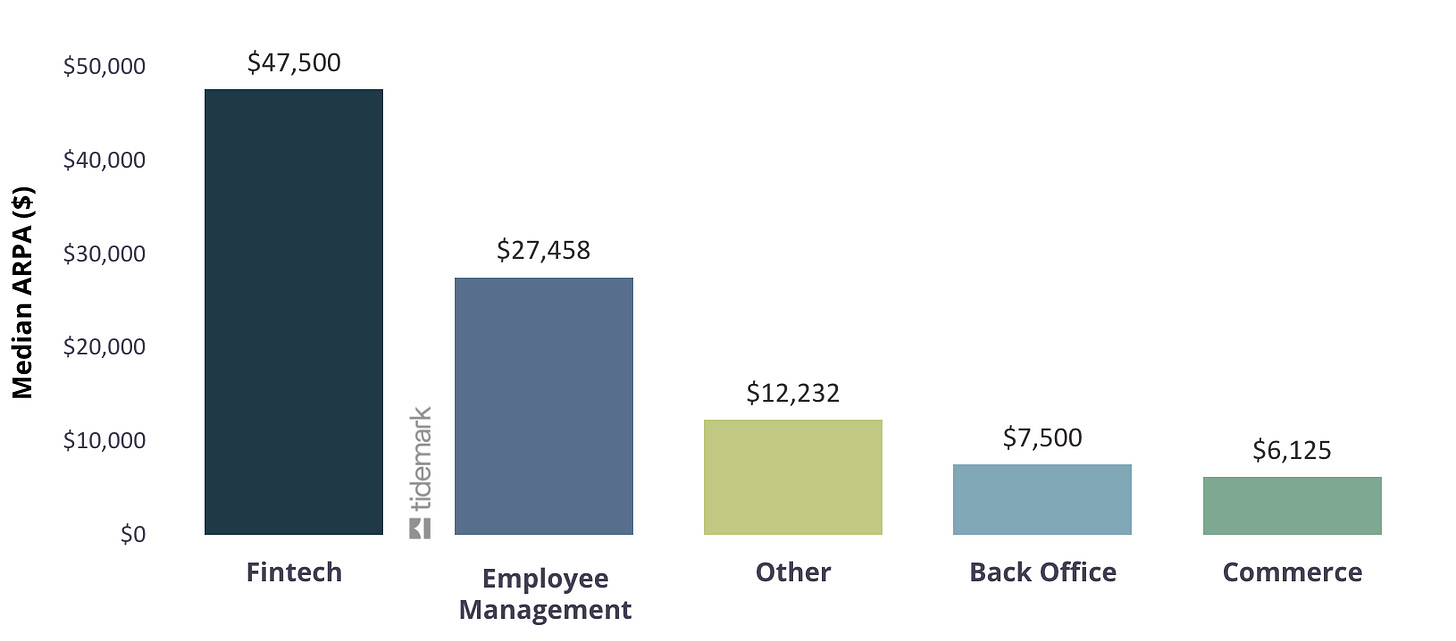#084: Tidemark's vSaaS Benchmarks & Playbook, AI Products, A New Type of vSaaS Category Is Emerging...
One vSaaS breakdown. One biz story. One 'how to'. In your inbox once a week.
Today’s episode is brought to you by the Vertical SaaS Bible, a library of 1,000+ industries ranked, 500+ investors, 100+ playbooks on founding and operating a vertical SaaS business.
It’s 10+ years of operating/investing experience distilled down for you.
Alright, let’s get to it…
One Biz Story
Tidemark’s Vertical SaaS Benchmark Study
Tidemark, a vertical SaaS focused growth equity firm just released a beautiful report that I was happy to partner with them on. Go grab the full report here.
But here’s my breakdown of it with some helpful thoughts:
#1. Tidemark (and myself!) believes there is a very clear playbook to build a big enduring Vertical Software company. The approach?
So let’s start with the respondents Primary Products. This is the key product that you start with that you have to nail! At CourseKey, we started with time tracking / attendance management. It was an AWESOME wedge, and helped us to break into hundreds of locations with something that was being done on paper prior to us.
The Median Average revenue per account is HIGHEST for products that are focused on fintech and employee management.
What do you do next? You go multi-product. Look at the difference in revenue of companies that do this…
Incremental revenue for expansion products varies widely. But heres the Tidemark view on which expansion products drive the most $ per account.
After you expand into multi-products. It becomes all about adding FinTech products. You have to move into revenue drives beyond your typical SaaS / per seat pricing models…
We just added payments and it is exceeding all of our expectations. It’s been an INSANE revenue / value driver. Just look at the payments opportuntities that stille xist out there:
How much can you get by adding payments? Well 0.8% is the average. I’ll let you in on a little secret. If you go with someone other than Stripe / Adyen, you can see 1%+. The annoying part is it will take a lot more engineering / dev work. But I think it’s worth it…
I’ve written my playbook and shared with you all many times on how to scale a vertical SaaS company, and it seems Tidemark largely agrees.
Build a wedge product (have to nail this)
Go multi-product and add a portfolio of products
Become the ‘platform’
Add FinTech product lines to expand beyond SaaS - payments, payroll, insurance, etc.
This is typically a 10+ year journey. But by the end of it this playbook typically leads you to pretty sizeable businesses. Industry/vertical obviously matters. But so many have proven this…
Thanks to the Tidemark folks for the great report, it was awesome to partner with you all on it. If you wan’t to review the full thing head here.
Hope you all enjoyed…
One ‘How To’:
A Quick Question…
How many of you have added an AI product into your vertical SaaS offering? Are you charging for it?
One vSaaS Breakdown:
A New Type of vSaaS?
Historically my belief has been that there are four types of vertical SaaS companies…
1. Classic Vertical SaaS: build software tailored to an industry, sell it to the businesses within said industry.
Examples:
Toast - Restaurant Software
Procore - Construction Software
CourseKey - Trade School Software
2. Digital Franchise: build and/or white label a software OS and an operating playbook. Support them via software and operating excellence.
Examples:
Moxie - Digital Franchise for MedSpas
Slice - Digital Franchise for Pizzerias
3. Venture Buy Out: Buy existing companies in an industry, transform them with your proprietary tech.
Examples:
Roofer .com - VBO for Roofing Companies
Metropolis - VBO for Parking Garages
Splash - VBO for Pool Cleaning Companies
4. Full Stack: Build from scratch a modernized business within a legacy industry.
Examples:
One Medical - Doctors Offices
Tend - Dental Practices
Tesla - Cars
But lately I’ve been seeing more and more companies building software tailormade for not just an industry, but specific jobs within an industry. Job-specific software isn’t anything new, but vertical-specific job software, specifically AI Co-Pilots is…
Is this a new category?
5. Role/Job Based AI Co-Pilots: build AI software tailored to a specific job type within a specific industry, sell it to those folks in said industry.
Examples:
Supermove - AI Copilot for Moving Co. Sales Reps
Spellbook - AI Copilot for Lawyers
Corti AI - AI Copilot for Healthcare Admins
Obvious released an AI Copilot Market Map, not all of which are vertical AI Copilots but still helpful to see/review/understand…
What do you think? Do industry specific job specific AI co-pilots deserve their own category?
Have a product or service that would be great for our audience of vertical SaaS founders/operators/investors? Reply to this email or shoot us a note at ls@lukesophinos.com













